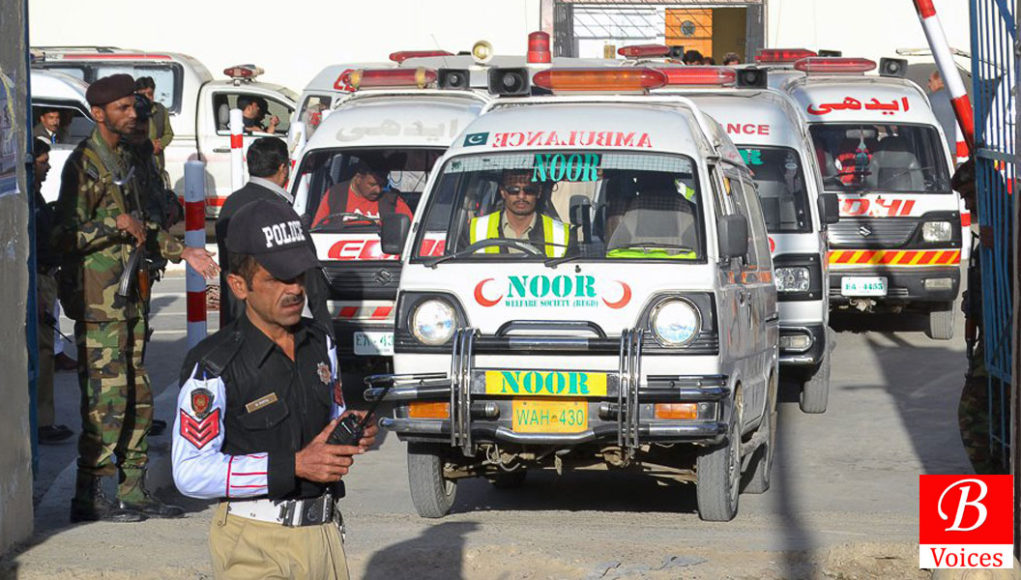Ayaz Ahmed
Once again lethally-armed terrorists shed innocent blood of 62 police cadets and wounded more than 116 in Quetta. Both the Al-Alimi faction of the Lashkar-e-Jhangvi (LeJ) and the militant Islamic State group are believed to be behind the deadly attack. Presumably, had the government learnt a serious lesson from the deadly terrorist attacks on the APS, Charsadda University and lawyer community in Quetta, this attack would have been prevented.
From these devastating attacks, it is crystal clear that resurgent terrorists and militants are bent upon eliminating the educated people and intelligentsia of already backward Balochistan. Ominously, they will succeed in their nefarious designs if the crisis-ridden government continues to avoid fully reviving dormant NACTA and stringently executing NAP.
But, it is rather worrying to note that this fatal attack has also failed to awaken the government from its deep slumber of inaction, incompetence and sluggishness in terms of countering disruptive terrorism, militancy and sectarianism in the country.
It has become an established norm in Pakistan that some top leaders of the government visit the wounded people after each terrorist attack. Despite receiving the threat of an imminent terrorist attack from the intelligence agency, the incompetent provincial government of Balochistan displayed an outright reluctance to pre-empt the assault. At present, the provincial government does not possess counter-terrorism laws and the needed force to flush out assorted terrorists and militants based in the province.
Both the civilian government and the military leadership consider the ongoing Operation Zarb-e-Azb a phenomenal success against terrorists and militants. Though the grand operation has successfully dismantled the organizational structures and training camps of the TTP and ilk, their leadership and hardcore fighters fled to neighboring Afghanistan and are freely operating from there under the nose and all-out support of Indian and Afghan intelligence agencies.
Moreover, a large number of fighters, financiers and recruiters of these outlawed groups have clandestinely shifted their operational bases to the unruly cities of the country. Apparently, these terrorists are waiting to regroup and resurface again after the ongoing operation as they did previously in the tribal areas.
All this makes it abundantly clear that terrorism and militancy have not only struck strong roots in terror-ravaged tribal areas, but also in the disorderly and unguarded cities throughout the country. Until Pakistan ultimately resolves the lingering issue of the porous Durand Line with war-stricken Afghanistan and beef up the security of major cities, no military operations can be termed as a prodigious success.
So, the illusion of exceptional successes against hardcore terrorists has made the civilian government satisfied, and thus disinclined to introduce comprehensive reforms in its ineffective and ill-conceived anti-terrorism laws, measures and institutions.
Like its predecessor, the incumbent government has utterly failed to grasp the modus operandi of terrorists and militants. These disruptive forces garner public support through a well-calibrated narrative. According to the Taliban ideology, Pakistan is under control of infidel forces, and it is the religious obligation of all Muslims to save it from these forces. A large number of Pakhtun population and students of seminaries staunchly adhere to this distorted notion, and are inclined to join the Taliban with the intent to embrace martyrdom.
The civilian government seems to be lacking the required resolve and guts to craft its counter-narrative and skillfully disseminate it. The government’s incompetence and the dearth of seriousness are patently obvious from its reluctance in removing hate-filled and jihadi literature from school books.
The government has so far dragged its feet in seriously implementing the crucial points of NAP. A large number of unregistered seminaries are still busy with churning out bigots, terrorists and extremists with their outdated reading materials. More alarmingly, only some half-hearted measures have been by far taken to block the increasing funding to terrorist, militant, insurgent and sectarian groups.
The government has also failed to flush out sectarian groups that are involved in targeted killings in the country. With different names, the LeJ and SSP organize mass rallies in big cities and openly threaten the Shia community. Rather than cracking down on these militant outfits, the state shuts down roads and provides foolproof security to these sectarian outfits.
The PML-N is apprehensive that these groups have disruptive street power which they could use to bring the country to a complete standstill. Moreover, the ruling party has some lawmakers who heavily rely on these sectarian groups to win their seats. But, should the government prefer party interest to the larger national interest of the country?
Terrorism and militancy are complex security problems which cannot be eliminated by just a military operation. After each military operation, the civilian government needs to some up with the effectual administrative system and police force to rehabilitate and secure the area. However, Pakistan neither possesses an efficient bureaucratic setup nor a depoliticized and potent police force to develop and protect its terror-infested tribal areas. It is sad to note that the current government is apathetic to reform these burdensome and underperforming sectors for better administration and security.
Pakistan cannot defeat trans-regional terrorists and militants without the sincere support of its neighbors. Unfortunately, the country is at cross purposes with India and Afghanistan and does not enjoy robust security ties with Iran. The sooner Pakistan cultivates friendship with these countries the better for its security.
Diplomacy is the best means to impede India and Afghanistan from arming, training and sponsoring Pakistani-based insurgents and terrorist. For this, the country not only needs a clear-cut foreign policy, but also a full-time and experienced foreign minister to manage the foreign policy.
What is needed is that the government should realise that there is no shortcut in carrying the day against assorted terrorists. If comprehensive security, administrative and socio-economic reforms are not introduced and stringently implemented, the country will continue to reel from ominous terrorism and militancy.
Writer is a featured columnist for Balochistan Voices. He can be reached at [email protected]
Share your comments!








